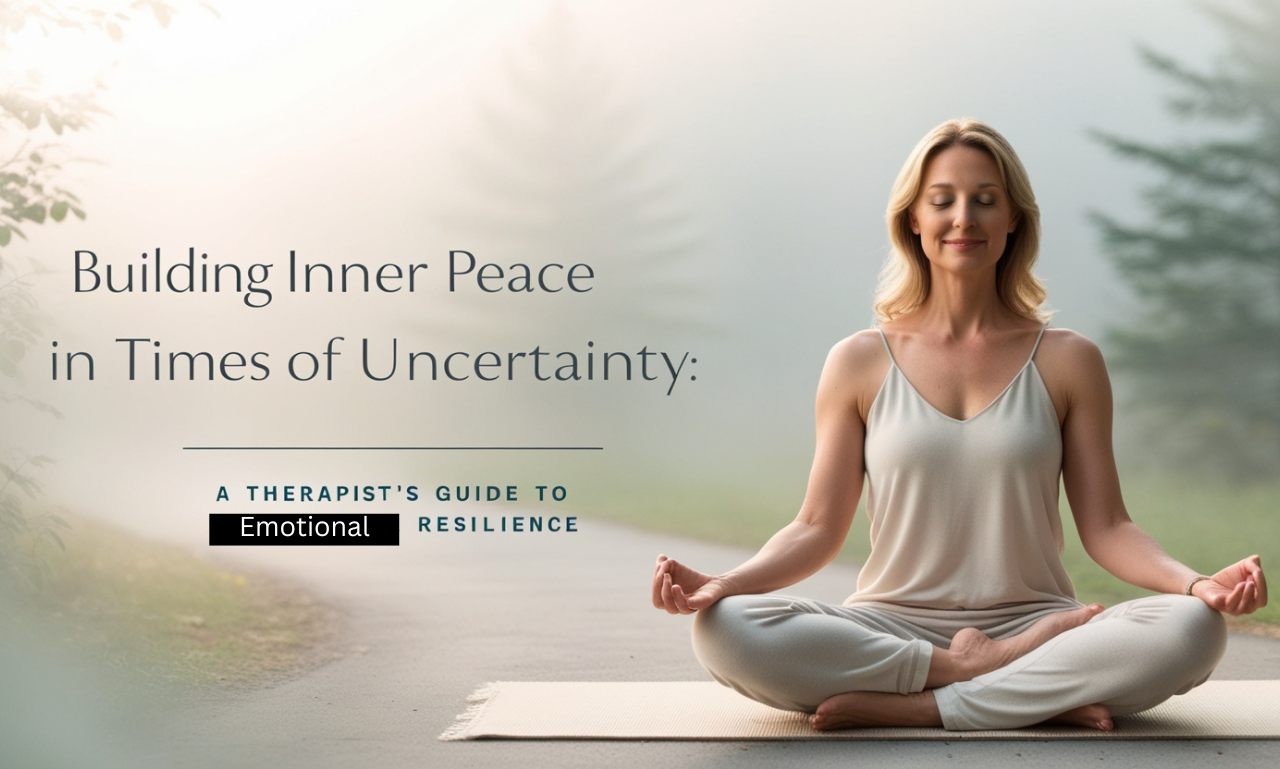Speaking from the Heart: Building Inner Peace in Times of Uncertainty: A Therapist’s Guide to Emotional Resilience.
Uncertainty is a part of life, but it can feel especially overwhelming when the future seems unclear. Whether it's due to a personal crisis, job insecurity, health concerns, or global challenges, these moments often trigger anxiety, fear, and emotional distress.
At Hearts to Healing Therapy, we understand how these experiences affect your mental and emotional balance. Inner peace doesn’t mean avoiding hard times—it means developing emotional tools that help you stay calm and resilient no matter what’s happening around you.
Here’s a therapist-approved guide to help you build inner peace—even when everything feels out of control.
Building Inner Peace in Times of Uncertainty: A Therapist’s Guide to Emotional Resilience
1. Understand Why Uncertainty Feels So Distressing
Human brains are content-seeking, predictable, and controllable. At the point of uncertainty, it is not uncommon for the nervous system to react to ambiguity with distress indicators, such as overthinking, irritability, sleeplessness, or physical manifestations like headaches and drowsiness.
It is normal to react this way; however, it does not necessarily need to be your Reality of emotions. The initial Step to attaining peace is knowing that your responses are acceptable; they can be controlled.
2. Use Mindfulness to Anchor Yourself in the Present
Worry exists in the future. We are concerned about what could happen or how things may go wrong. Inner peace, however, resides in the present. Basic mindfulness practices, such as deep breathing, body scanning, and sensory grounding, are essential for enabling your thought process to refocus on the situation as it is, rather than the anxious worry.
Try this: Inhale deeply through your nose for 4 seconds, exhale slowly through your mouth for 6 seconds. Repeat four times.
Or use the 5-4-3-2-1 technique: Notice five things you see, four you can touch, three you hear, two you smell, and one you taste.
These tools help train your mind to stay present—and that’s where peace begins.
3. Reframe Negative Thinking with Cognitive Tools
When in doubt, pessimistic thoughts create a vicious cycle. You might even begin to think that you are incapable of doing something or that things are crumbling.
Cognitive Behavioural Therapy (CBT) will enable you to notice such thoughts and then restructure them with more positive ones. Rather than saying, This is too much, you can tell yourself This is difficult, but I am doing the best I can.
Some people tend to believe that framings are a denial of Reality; in that case, reframing thoughts provides the mind with a healthier way to think about Reality.
4. Create a Daily Routine to Build Stability
One of the most effective ways to feel grounded in uncertain times is to establish a daily routine. Routines give your brain something predictable to hold onto when the world feels unstable.
Include basic anchors like:
Waking and sleeping at regular times
Limiting social media and news intake
Taking mindful breaks or walks
Eating nourishing meals and staying hydrated
Having a short morning or evening reflection
A therapist can help you design a routine that feels supportive without becoming rigid. Small, consistent habits are powerful tools for emotional balance.
5. Practice Acceptance Instead of Resistance
Peace is not a show that everything is okay. It has something to do with accepting the Reality of your experience without being overwhelmed by it.
With acceptance, this does not sound. And it goes something like this: This is tough, and I have the right to experience that, but I can still manage myself.
Our clinicians will assist clients in setting aside their struggle against Reality and begin to respond to it with compassion and clarity using Acceptance and Commitment Therapy (ACT). Acceptance is not resignation, but it is a release of the effort not to like what you have no control over.
6. Reconnect with Your Core Values
When life feels uncertain, your values become your compass. They guide how you show up, even when the path ahead is unclear.
Ask yourself:
What truly matters to me in this season?
How do I want to treat others—and myself?
What do I want to embody today? Calm? Courage? Compassion?
At Hearts to Healing Therapy, we help clients explore and reconnect with their values. Living in alignment with those values brings a more profound peace that isn't dependent on external circumstances.
7. Balance Solitude and Support
Stillness and connection are both essential. Too much noise can overwhelm you, but isolation can increase distress.
Make space for intentional solitude:
Try journaling in silence
Take a slow walk without music or screens.
Practice prayer or reflection.
At the same time, maintain connections with supportive relationships. Consider speaking with a therapist, reaching out to a trusted friend, or joining a support group. An emotional connection reminds you that you’re not alone in your struggles—and that brings relief and a new perspective.
8. Protect Your Emotional Energy with Boundaries
In times of stress, emotional energy is precious. Without clear boundaries, you may absorb other people’s stress, overextend yourself, or ignore your own needs.
Therapy helps you:
Recognize where your limits are
Say no without guilt.
Avoid taking responsibility for others' emotional states.
Protecting your peace doesn’t make you selfish—it makes you sustainable. When you care for your energy, you have more to give in ways that are healthy and lasting.
You Can Build Peace—Even in Uncertain Times
We live in a world of uncertainties, but we do not need to live our lives alone in anxiety. Peace must be practised every day and built on purposeful actions, empowered by caring attention.
We understand that you already possess the potential for inner peace, focus, and emotional stability, and we will be able to help you. There is no need to suffer alone if you are feeling overwhelmed, and we are here to support you throughout your recovery process and help you regain your inner peace.


